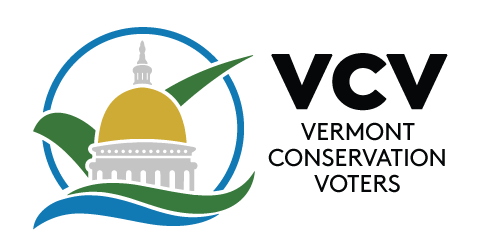FOR IMMEDIATE RELEASE
January 31, 2017
Contact: Lauren Hierl, Vermont Conservation Voters Political Director, lhierl@vermontconservationvoters.org
Vermont Conservation Voters to Release Environmental Common Agenda of 2017 Legislative Priorities
VCV and partners to release guide of top environmental priorities and proposed legislative solutions for lawmakers in 2017
Montpelier, VT – Today, Vermont Conservation Voters will release its 2017 Vermont Environmental Common Agenda of legislative priorities at a reception in the Cedar Creek Room of the Vermont State House.
The Common Agenda represents the priorities of a range of environmental organizations across Vermont working on matters affecting our shared natural resources, the character of our communities, and the health of Vermonters.
“Vermont’s leading environmental groups have come together to call on the Legislature to invest in clean water, protect our communities from toxic chemicals, and support our clean energy economy,” said Lauren Hierl, political director of the Vermont Conservation Voters (VCV). “A clean environment and healthy communities are essential to a thriving Vermont,” added Hierl.
VCV and partner groups will advocate for the following priorities in the 2017 legislative session:
- Enact robust, sustainable, long-term funding that appropriately invests in our water cleanup efforts, and build on the Vermont Clean Water Act (Act 64) to continue improving water quality regulations.
- Protect public health by reducing exposure to toxic chemicals. Policy solutions needed to achieve this goal include:
- improving public access to quality information on chemicals used in Vermont communities,
- helping companies reduce their use of toxic chemicals in both operations and products,
- restricting the use of toxic PFOA and similar chemicals in food packaging and dental floss, and
- strengthening legal remedies for Vermonters exposed to hazardous substances.
- Action on climate change and growing our clean energy economy. Policy solutions needed to achieve this goal include:
- committing to Vermont’s goal of 90 percent renewable energy by 2050,
- maintaining progress on renewable energy development in a way that is accessible to all Vermonters,
- opposing road blocks to renewable energy development and successful energy efficiency programs, and
- continuing to explore carbon pollution pricing paired with tax cuts to spur job creation, keep more energy dollars local, and foster greater energy independence.
Partner groups signed onto the Common Agenda include: Vermont Conservation Voters (VCV), Vermont Natural Resources Council (VNRC), Vermont Public Interest Research Group (VPIRG), Conservation Law Foundation (CLF), Vermont Chapter of the Sierra Club, Toxics Action Center (TAC), Audubon Vermont, Lake Champlain Committee, Lake Champlain International, and the Preservation Trust of Vermont.
“Vermont has taken important steps forward in recent years on such issues as cleaning up water pollution, maintaining healthy forests, and building our clean energy economy. Despite our past accomplishments, with a hostile federal administration in Washington D.C., Vermont lawmakers will need to be more vigilant and engaged than ever to ensure we support a clean, healthy environment, which is essential to a healthy economy,” said Brian Shupe, executive director of the Vermont Natural Resources Council.
“Every year, doctors and scientists are raising the alarm that even small amounts of toxic chemicals can have serious, long-term consequences on human health. As emerging contaminants like PFAS cause extensive environmental health impacts, we must close the loopholes in our chemical regulations and better protect our families and communities from exposure to toxic chemicals,” said Shaina Kasper, Vermont state director of Toxics Action Center.
“Our working landscape has sustained generations of hardy Vermonters,” said Paul Burns, executive director of VPIRG. “Now that our working landscape includes clean energy, we have a chance not only to keep more of our young people working here, but we can do it in a way that improves our economy and helps to curb global warming too,” said Burns.
“We are committed to collaborating with our partners to ensure the issues laid out in the Common Agenda are adequately addressed. Together, we will urge the General Assembly and the Governor to protect and invest in a healthy environment as the basis for a strong economy,” said Robb Kidd, conservation program manager at the Vermont Chapter of the Sierra Club.
“Vermont’s forests are a globally important breeding habitat for migratory birds. Last year’s Act 171 took important steps toward keeping large forest blocks intact for the benefit of our recreation and timber economy, water quality, and climate. This year the legislature can build on this by fully funding the Vermont Housing and Conservation Board, implementing tax reform to help private forest land transfer to the next generation, and making sure land use permits work to keep forest blocks intact,” said Jim Shallow, state director of Audubon Vermont.
“Never has it been more important for Vermonters to unite to protect our air and water. When those in power believe the Clean Water Act is bad for Vermont and bad for America, it is clear they just don’t mean to exploit our air and water, but us as well. I’m proud to stand with my colleagues and fellow Vermonters in our call for clean air and water, and I expect Vermont politicians to do the same,” said James Ehlers, executive director of Lake Champlain International
Each year, Vermont Conservation Voters publishes the Environmental Common Agenda of legislative priorities and works side-by-side with elected officials to address priority issues. VCV assesses lawmakers’ leadership, support, or opposition to Common Agenda priorities in VCV’s annual Environmental Scorecard, released at the end of each legislative biennium, which voters can use to review lawmakers’ voting records on environmental issues.
Founded in 1982, Vermont Conservation Voters works to elect environmentally-friendly candidates to public office, and then holds elected officials accountable for the decisions they make affecting our air, water, communities, land, and wildlife. To learn, please visit: www.vermontconservationvoters.org or follow us on facebook.com/ VermontConservationVoters and Twitter @VoteGreenVT and @Lauren_VCV
###
